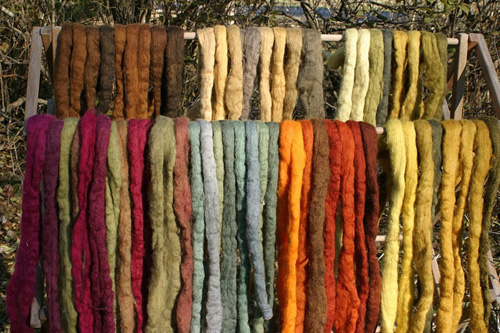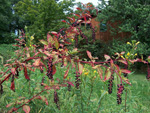Hillcreek Fiber Studio & Yarn Shoppe
by Carol Leigh Brack-Kaiser
Carol Leigh's Specialties was founded in 1982 as a part-time custom weaving, spinning and natural dyeing studio. Over the years, my personal creative love metamorphosed into a family business in ways I could never have imagined.

Photograph Copyright by Carol Leigh Brack-Kaiser
In 1986, it became a full-time teaching studio, Hillcreek Fiber Studio. Teaching in the Studio then evolved into teaching around the country, at various venues. Needing tools, equipment and supplies for teaching, we took on a number of distributorships, becoming a retail outlet and mail order enterprise. My fascination with the “magical triangle” weaving method, which uses a continuous strand for both warp and weft, turned into a manufacturing operation employing both my son Carl and husband Dennis. This led to the patenting of a unique adjustable fixture, development of square and rectangle shapes using a similar continuous strand weaving method and, with Victorian Videos, the production of an acclaimed video on the continuous weaving method on the triangle.
My early ventures demonstrating at historic craft fairs expanded to include the whole family. Daughters Rebecca and Rose were vendors at venues such as the Maryland Sheep festival, the largest of its kind in the USA, as well as at Convergence, the international weaving conference. My early one-page flier to customers and students announcing upcoming classes is now a semi-annual 12-page newsletter sent to 10,000 people. Record keeping was originally done using Lotus 123 and MS-DOS Word Perfect on my first computer in 1989. Today, my “ex”, Phil, a self-taught computer guru, is our web master and publisher, developing our web sites and publishing our brochures and newsletters, as well as maintaining company records on much more sophisticated software. Our home-based studio became cramped when Rebecca developed the knitting end of our business, and thus we've expanded to a second location where she manages Hillcreek Yarn Shoppe, a knitting store-front near the Interstate highway and downtown Columbia. I feel fortunate that every member of my family has specialized talents and is interested in contributing.
At my first Convergence conference, in Seattle, in 1982, I had the opportunity of taking a week-long workshop with Michele Wipplinger. Having had an earlier experience with “found” Missouri native dye plants, I now was hooked on dyeing. I had always been attracted to the notion that "Nature Provides": fibers, food, medicine, shelter and now, color! However, I soon realized how little I knew of color theory, design, and fiber properties, and I so went back to school to earn a Masters in Textiles, with most of my research focused on the historic aspects of nature dyeing. Besides the workshop with Michele, I have studied natural dye techniques with renown dyers such as Jim Liles, Karen Castleman, John Marshall and Sarah Natani on the Navajo reservation, as well as Mehmet Girgic, a renowned dyer and felter in Turkey.Hillcreek Fiber Studio strives to maintain one of the most comprehensive sources for natural dyes and dye aides. We offer everything from Alkanet to Zinc, naturally. We are the US distributor of woad pigment for Bleu d'Lectour in France, and are listed as an international natural dye source in Harold Bohmer's Koekboya, the most comprehensive book on natural dyes and their world-wide use of which I'm aware.
Hillcreek Fiber Studio, nestled in the Little Bonne Femme Creek valley, offers week-end and longer workshops in all aspects of weaving, spinning, and natural dyeing throughout the year, complete with bed and breakfast at the Studio. Our Missouri Dye Plants workshop is offered every September. In two days we obtain over sixty full-spectrum colors from plants within walking distance of the Studio, including lasting reds from pokeberry, blue and green from elderberry; yellows, oranges, golds and greens from flowers such as goldenrod and bidens; and browns, blacks and greys from trees such as walnuts, sumac and alder. A workshop on Ancient Dyes is offered every winter, using the vibrant commonly-used dyes of indigo, cochineal, madder, logwood, brazilwood, fustic, cutch and safflower. Occasionally, we offer a workshop on the least known ancient dyes. During the week-long Fiber Furlough One each summer, surface design with natural dyes is offered along with submersion dye techniques, spinning, and wet and dry felting. Fiber Furlough Two offers all forms of weaving, including Four Shafts and More, Navajo, Continuous Strand on Triangles, Squares and Rectangles, Inkle, Tablet, and more.
Our Web site, www.hillcreekfiberstudio.com, with secure shopping cart, lists products and classes, and a copy of our semi-annual newsletter with event schedule. Our knitting shop site is www.hillcreekyarnshoppe.com. Toll-free phone for Hillcreek Fiber Studio is 1-800-TRI-WEAV (874-9328), and for the yarn shop, 1-866-482-KNIT (5648). Phone: 1-800-TRI-WEAV (874-9328)
Website: www.hillcreekfiberstudio.com
 Turkey Red Journal
Turkey Red Journal
